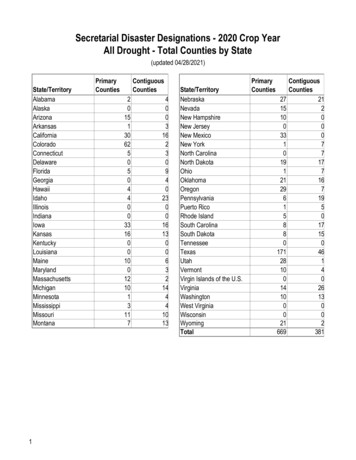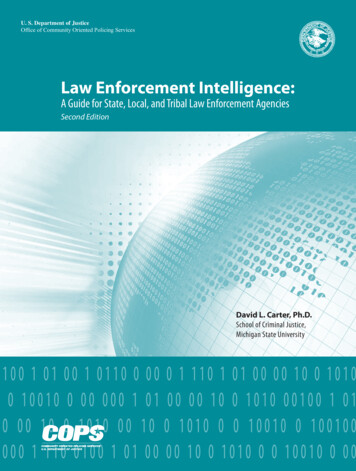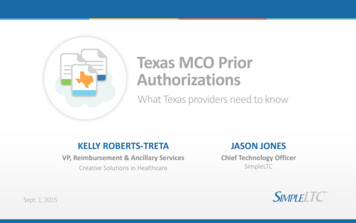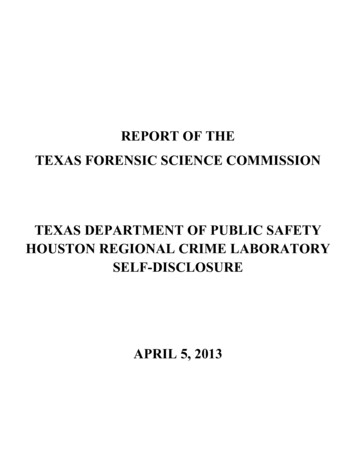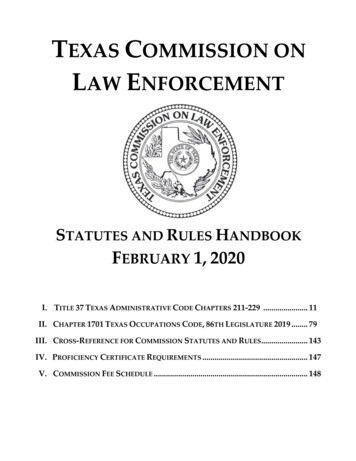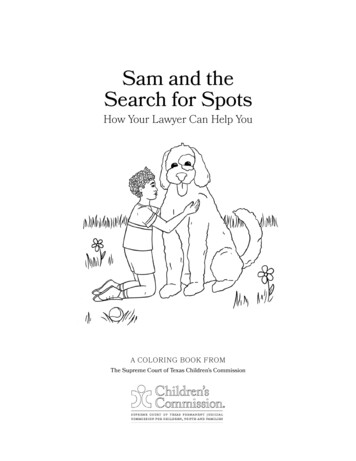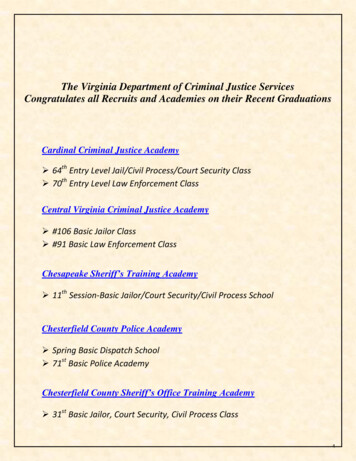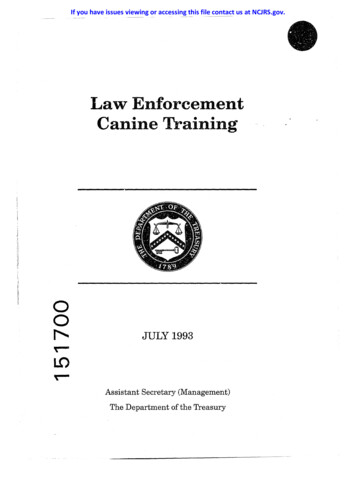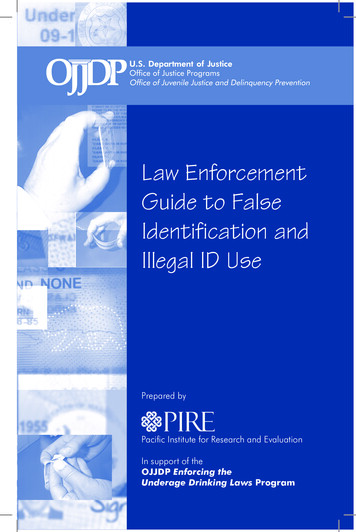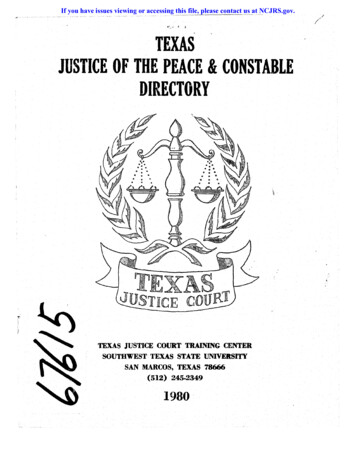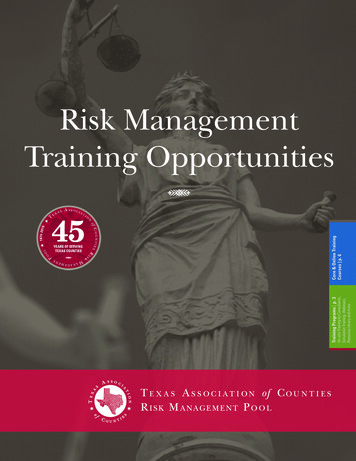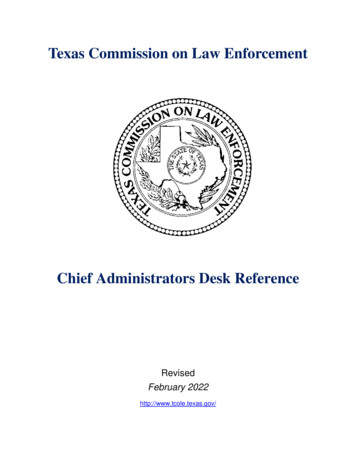
Transcription
Texas Commission on Law EnforcementChief Administrators Desk ReferenceRevisedFebruary 2022http://www.tcole.texas.gov/
Table of ContentsMission of TCOLE . 5Authority of TCOLE . 5Governance . 5Overview of TCOLE . 5TCOLE’s Service Obligation . 6TCOLE Complaint Process . 6Field Service Agents . 6Required Training for Initial Licensing . 7Basic Training Requirements . 8Peace Officer.8Out of State, Federal, and Military Police officers .8County Jailer .8Telecommunicator .8Disqualification for Licensure – Criminal Conviction . 8Appointment of Chief Administrators, Peace Officers, County Jailers, and Telecommunicators . 9Licensing Standards .9Medical Examination required .9Constitutionally Elected Officials . 10Municipal Chiefs of Police . 10Required TCOLE Licensing Paperwork . 10Contract Jailers. 10Minimum required documentation for initial appointment:. 11Appointment of individuals already licensed by TCOLE: . 11Law Enforcement Agency Self-Audit Checklist.Error! Bookmark not defined.Appointment of New Chief Administrators (already licensed): . 12Reporting Separation or Termination of Appointment (F-5) . 12Peace Officers, County and Contract Jailers, and Telecommunicators . 12Continuing Education. 13Chiefs of Police . 13Constables. 13Peace Officer . 14Deputy Constables . 14Persons licensed as Jailers, Reserve Officers, & Public Security Officers . 15TCOLE Desk Reference Book (Feb 2022)Page 1
Telecommunicators . 15Assignment-specific Training . 15Consequences of failing to meet all Continuing Education requirements: . 15Proficiency Certification Requirements . 15Professional Achievement Awards . 16Training Provider Requirements . 16Audits of Agency Records . 17Texas Peace Officers Memorial . 17State Flag Distribution . 17Statutory Requirements . 18Background Confirmation Form (BCF) . 18Annual Racial Profiling Report. 18Disciplinary Actions . 18TCOLE Desk Reference Book (Feb 2022)Page 2
Dear Law Enforcement Administrator:Your position as a law enforcement administrator will require you to know manythings, not the least of which is the rules and regulations of the TexasCommission on Law Enforcement (TCOLE) that are directly related to the dailyoperation and management of your law enforcement organization. Our goal is tohelp you properly procure and maintain your officer’s credentialing and trainingrecords.To that effect, we are pleased to provide you with this publication which containssome basic information about our agency, your responsibilities as a lawenforcement administrator, and a brief explanation of the processes required forthe proper administration of a law enforcement agency.As a law enforcement administrator, it is your responsibility to ensure that youand your agency’s personnel receive required training and comply with allapplicable Texas statutes and TCOLE Regulations.This publication also includes the legislatively mandated training requirements fornew and currently serving Chiefs of Police, Constables, Sheriffs and other lawenforcement agency administrators.If you have questions or need assistance, we encourage you to email or write tous instead of contacting us by telephone, so we can ensure we fully understandyour question and can provide you with the correct answer.Sincerely,Kim VickersExecutive Directorwww.tcole.texas.govTCOLE Desk Reference Book (Feb 2022)Page 3
Staff Contact InformationExecutive DirectorChief Kim Vickers, Executive Director (512) 936-7712Laurie Jackson, Exec. Asst. (512) 936-7771General Counsel DivisionJohn Beauchamp, General Counsel, Phone: (512) 936-7746Jennifer Castillo, Legal Asst. Phone (512) 936-7778Rainee Treviño, Open Records, Phone: (512) 936-7763Government Relations DivisionGretchen Grigsby, Director of Government Relations & PIO Phone: (512) 936-7715Ken Mobley, Memorial Flag Program Phone: (512) 936-7705Financial ServicesBrian Roth, Director Chief Financial Officer Phone: 512-936-7725Finance, Purchasing, Fiscal Affairs and HUB vendorsCredentialing, Education and Field Services DivisionDirector Cullen Grissom, Phone 512-936-7773Lisa Landry, Section Supervisor Phone: 512-936-7749Rachel Reinhart, Section Supervisor Phone: 512-936-7743Captain Richard Gutierrez, Phone: 512-923-0916Enforcement and Special Services DivisionDirector Michael Antu, Phone: 512-936-7750Captain Doug Skolaut, Phone: 512-936-7759Captain Gary Connella, Phone: 512-936-7774Jessica Capraro, IT Mgr. Phone: 512-936-7702F-5R/BCF and TSS help deskSarah Childress Phone: 512-936-7735Melissa Jansky Phone: 512-936-7764Address, Fax & other contact informationTexas Commission on Law Enforcement,6330 E Highway 290, Suite 200Austin, Texas 723-0135TCOLE Desk Reference Book (Feb 2022)Main NumberFax Number512-936-7700512-936-7714TCOLE Website Address:http://www.tcole.texas.gov/Page 4
The Texas Commission on Law Enforcement (TCOLE) is a state law enforcement agencycreated by Senate Bill (SB) 256 of the 59th Legislature, which became effective on August 30,1965.Mission of TCOLETo ensure that the people of Texas are served by highly trained and ethical lawenforcement, corrections, and telecommunications personnel through the establishmentand enforcement of minimum standards.Authority of TCOLETCOLE’s statutory authority is codified in Occupations Code, Title 10 - OccupationsRelated to Law Enforcement and Security, Chapter 1701 - Law Enforcement Officers.Through the authority of Section 1701.151(2), TCOLE is empowered to establishminimum standards relating to competence and reliability, including education, training,physical, mental, and moral standards, for licensing as an officer, county jailer, or publicsecurity office or employment as a telecommunicator.GovernanceTCOLE is governed by a 9-member board of Commissioners, each appointed to a sixyear term by the Governor of the State of Texas. The Commissioners are comprised ofthree (3) chief law enforcement administrators, three (3) peace officers, and three (3)public members. Commissioners usually meet quarterly but may meet more often ifnecessary. To access the list of Commission members and meeting schedule log on sion-and-its-membersOverview of TCOLETCOLE is staffed by a very limited number of dedicated employees. They are responsible foroverseeing and administering specific statutory mandates including, but not limited to setting theminimum training and licensing requirements for peace officers, county jailers and emergencycommunication operators; establishment of minimum requirements for proficiency certifications;facilitation of technical assistance; instruction and evaluation of training providers; auditing ofcredentialing records; prevention and deterrence of statutory and administrative rule violationsthrough proactive training and disciplinary measures; and the administration of the state’s lawenforcement achievement awards and Texas flag for deceased peace officers program.The Executive Staff is comprised of the Executive Director; two Operational Directors: one overthe Credentialing, Education and Field Services Divisions; and another over Special Servicesand Enforcement; plus offices of General Counsel, Government Relations, Human Resourcesand Financial Affairs and two executive assistants.Credentialing Services personnel oversee the issuance of licenses and certifications, recordingand filing of training rosters and construction and maintenance of licensee records.The Education Services Division staff oversees the development and delivery of trainingcurriculum and licensing exams. They also manage and deliver licensing examinations for newlicensees. Education Services provides training via the MyTCOLE online training platform andgives technical support to training providers.Field Services staff members conduct audits of credentialing files and on-site inspections ofagency number applicants to ensure compliance with Rule and statute; they also conducttraining sessions; deliver and present memorial state flags for fallen officers and provide fieldsupport and technical one-on-one tutoring for chief administrators and their staff.TCOLE Desk Reference Book (Feb 2022)Page 5
The Special Services Division screens, evaluates and approves applications for new agencylicenses and training provider contracts as well as continuously evaluating training programsand training files, and are responsible for technical support and information technology projects.Enforcement Division staff investigate allegations of criminal and administrative rule violations.They initiate disciplinary actions (reprimands, suspensions, revocations, etc.) and file criminalcases, as warranted, to ensure compliance with Texas Occupations Code and Commissionrules.The Office of General Counsel team oversees disciplinary action, separation appeals, andworks with the State Office of Administrative Hearings (S.O.A.H.). They also monitor continuingeducation compliance, open records requests, and rule development.The Government Relations Director and her staff are the first point of contact for Legislators andtheir aides. They also help administer the Peace Officer Achievement Awards and memorialTexas flag program.Fiscal Services employees are responsible for the accountability of all budgetary allotments andexpenditures; personnel and time records; equipment inventory and all other fiscal programs.TCOLE’s Service ObligationCitizens have the right to know how their government performs its responsibilities. At TCOLE,we are committed to help facilitate requests for information as they are received. Under normalworking conditions, we strive to return all voicemail messages within 24 hours during the regularbusiness week. It must be pointed out that voicemail and e-mail messages sent to staffmembers who travel frequently may not be read for several days.Open records requests should be submitted in writing. Unless the information requested isprotected from disclosure by law, (for example, F-5’s); requests for information are processedby our public information office staff as soon as possible on a “first come - first served” basis.Please keep in mind that the most commonly requested information is readily available from ouragency’s website. Immediate familiarization with this helpful resource is, therefore, essential tothe continued development of every chief administrator regardless of tenure.TCOLE Complaint ProcessBy policy, all complaints concerning official acts of TCOLE Commissioners or personnel mustbe addressed in a prompt and courteous manner. Depending on the type and severity of theinfraction, sustained complaints can result in disciplinary action.By the same token, and to the extent authorized by rule and statute, we are obligated toinvestigate all allegations of Texas Occupations Code and/or Administrative Rule violationscommitted by licensees. All complaints are investigated in accordance with existing statutoryand procedural guidelines.As a general rule, all formal complaints (including those outside of purview) are acknowledgedin writing. When applicable, notification of case disposition is also sent to the complainant.Field Service AgentsIn 2006, TCOLE began deployment of the current Field Agents. The program now has 8 FieldAgents, each assigned to a geographic region. Field Agents directly support LE agencies intheir region by conducting training, performing audits, and providing technical onal-support-field-service-agentsTCOLE Desk Reference Book (Feb 2022)Page 6
Required Training for Initial LicensingSections 1701.251 and 1701.253 of the Texas Occupations Code (TOC) requires that TCOLEdraft, implement, update, and regulate preparatory and continuing education courses for everytype of law enforcement license it regulates. The Commission administers said trainingmandates through authorized law enforcement academies (LEA’s) and approved contractualtraining providers. A list of all training mandates is readily accessible on the TCOLE website.Section 1701.255 of the TOC requires that TCOLE establish minimum qualifications forenrollment in any basic licensing course. This section specifically prohibits the enrollment of anindividual who does not meet the minimum requirements stipulated under Rule 217.1.Section 1701.304 of the TOC requires successful completion of a licensing exam for any licenseissued by TCOLE. Eligibility requirements to take licensing examinations may be found inSection 219.1 of the Administrative Rules.TCOLE Desk Reference Book (Feb 2022)Page 7
Basic Training RequirementsPeace OfficerPeace officer applicants are required to successfully complete the current Basic Peace OfficerCertification courses (#1000696) and pass the licensing exam prior to being licensed.Out of State, Federal, and Military Police officersAfter an application has been reviewed and approved by TCOLE staff, officers licensed in otherstates, selected federal officers (identified in 2.122 CCP), or military police officers are allowed toenroll in the Supplemental Peace Officer Course (#1018). Upon successful completion of thecourse, and any other courses required by TCOLE, applicants earn an endorsement to take thelicensing exam.County JailerCounty jailers must complete the current Basic County Corrections courses (#1120) andsuccessfully complete the licensing examination to receive their license.Appointment as a temporary jailer is allowed for up to one (1) year provided the individual meetsall the other minimum requirements. Temporary jailers must enroll in the Basic CorrectionsOfficer Certification Course (BCOCC) within 90 days from appointment date and mustsuccessfully complete the Basic Corrections Officer (BCO) course and pass the licensingexamination within twelve (12) months from the initial appointment date. After that, a temporarylicense automatically expires and it cannot be renewed.Section 1701.310 of the TOC states that an individual who successfully completes the TexasDepartment of Criminal Justice (TDCJ) corrections officer course will not be required tocomplete the Basic County Corrections training course in order to be appointed as a part-timecounty jailer. However, all other appointment requirements including the licensing exam,psychological and medical evaluation, will still apply.TelecommunicatorHouse Bill (HB) 1951 of the 83nd legislative session upgraded the emergency communicationsoperator’s certification to a license effective 01/01/14. With the exception of firearmsqualification, all licensing requirements apply to Telecommunicator appointments.In addition to the current 80 hours of basic telecommunications training (#1080); a minimum of20 hours of continuing education training every two (2) years and a CPR for telecommunicatorscourse have also been legislatively required. .Sections 1701.405(g) and (h) of the TOC allow temporary appointment of a telecommunicatorfor a period not to exceed one (1) year. If the appointee does not satisfactorily complete thebasic preparatory course (#1080) the appointment must be terminated using form F-5. Oncethat temporary appointment has expired, it may not be renewed as such for at least anotheryear. Successful completion of all required courses, however, authorizes the appointment ofthat person at any given time, provided all other prerequisites are met.Disqualification for Licensure – Criminal ConvictionSection 1701.312 specifically disqualifies a person from being licensed as an officer, countyjailer or telecommunicator if the person has been convicted of a felony offense. A felonyconviction exists if the person has been adjudged guilty of a felony offense under the laws ofTexas, another state, or the United States Code. Further, Chapter 217.1 disqualifies a personwho has been convicted of a Class B Misdemeanor offense for a period of 10 years and aperson convicted of a Class A misdemeanor for life. Waivers are obtainable 5 years afterTCOLE Desk Reference Book (Feb 2022)Page 8
conviction, under certain circumstances, for misdemeanor offenses, and are addressed in Rule211.30.A person adjudged guilty of a disqualifying offense but placed on probation is for all licensingpurposes considered to be convicted. Key phrases like “adjudged guilty” or “found guilty” are aclear indication of a permanent conviction. This type of adjudications will be treated asconvictions regardless of whether: (1) the sentence is subsequently probated, and the person isdischarged from community supervision (aka “deferred adjudication”); (2) the accusation,complaint, information, or indictment against the person is dismissed and the person is releasedfrom all penalties and disabilities resulting from the offense; or (3) the person is pardoned for theoffense, unless the pardon is granted expressly for subsequent proof of innocence.Under current Federal Statutes (U.S. Code, Title 18, Crimes and Criminal Procedure, Part 1,Crimes, Chapter 44, Firearms, Sections 921(a)(33)(A)&(B), and 922(d)(g)&(h)) a personconvicted of any crime involving domestic violence or subject to any type of restraining orderissued by a court of competent jurisdiction is prohibited from owning or possessing firearms orammunition – which automatically disqualifies the individual from being licensed as a peaceofficer. Furthermore, administrative rules prohibit the issuance of any TCOLE license to aperson convicted of an offense which involved family violence.Extra caution is advised when reviewing an applicant’s criminal history. Section 1701.553 of theOccupations Code makes it a state jail felony to appoint or retain a convicted felon (see alsosections 1701.312 and 1701.313). It is also a criminal offense to knowingly make a falsestatement on any TCOLE license application. Keep in mind that computerized criminal histories(CCH’s) are often inconclusive, incomplete, or incorrect. When in doubt, always procure certifiedcopies of court records and up-to-date fingerprint verification. All these records are auditableitems which must be kept readily accessible for inspection by TCOLE reps throughout theindividual’s employment and no less than five (5) years after his or her termination.Appointment of Chief Administrators, Peace Officers, County Jailers, and TelecommunicatorsLicensing StandardsSection 1701.153 of the TOC requires that TCOLE set prerequisites and processing guidelinesfor appointment and termination of peace officers, county jailers and telecommunicators. It alsoemphasizes a chief administrator’s obligation to comply with all TCOLE reporting requirements.Section 1701.301 prohibits the appointment, employment, or utilization of an unlicensed personas a peace officer, county jailer, school marshal, public security officer or telecommunicator.This type of violation is punishable by a fine of up to 1,000.00 dollars (See section 1701.551).Section 1701.303 requires law enforcement agency administrators to notify TCOLE of all newappointments and to also ensure that all the required documentation has been procured.Medical Examination requiredSection 1701.306 prohibits issuance of a TCOLE license unless the applicant has undergone apsychological and emotional health examination, been screened for any trace of drugdependency or illegal drug use and undergone a standardized physical examination. Theseexaminations must be conducted by a Texas licensed physician or psychologist selected by theappointing agency (not the applicant) within 180 days PRIOR to the date of appointment. Thefirst appointing agency is allowed to use the examination forms from the LE Academy providedthe appointment takes place within 180 days from graduation. Medical and drug exams must bedocumented on the L-2 form, and the psychological and emotional health evaluation must bedocumented on the L-3 form. These two forms are not subject to HIPAA restrictions becausethey are not a medical record. NOTE: Both documents belong to TCOLE, but they are simplyentrusted to the care and custody of the LE Academy or appointing agency staff.TCOLE Desk Reference Book (Feb 2022)Page 9
Section 1701.153 of the TOC makes the chief administrator responsible for compliancewith all reporting requirements and procedures prescribed by the commission.Constitutionally Elected OfficialsCertain law enforcement officers elected under the Texas Constitution are exempt from some ofthe aforementioned licensing requirements. For example, constables who took office beforeSeptember 1, 1985, and have continued holding the same office without a break in service, arenot required to comply with Chapter 1701 of the Occupations Code. They are exempt fromlicensure and annual firearms proficiency demonstration.Constables who took office between September 1, 1985, and August 30, 1999 were granted twowhole years from the date they took office to obtain a peace officer license; but they were notexempted from all the other TOC requirements.In 1999, the 76th Legislature amended Section 86.0021, Local Government Code to provide thatConstables who take office on or after August 30, 1999, have a maximum of 270 days to obtaina license and submit it to their commissioner’s court. Sheriffs, on the other hand, still have up totwo years from the date of taking office to obtain their peace officer license.Elected officials (sheriffs, constables, and elected chiefs of police) are allowed to sign their ownL-1 form. All other peace officers must have their L-1 signed by the agency’s chief administratoror his designee. The L-1 of an appointed chief of police must be signed by that chief’sappointing authority (city managers, airport managers, ISD superintendents etc.)Municipal Chiefs of PoliceSection 96.641 of the Texas Education Code (TEC) requires the chief of a municipal policedepartment to be licensed not later than one year after the appointment date. Unlike theirconstitutionally elected counterparts, municipal chief administrators (mayors, city managers,public safety directors, etc.) have no law enforcement authority prior to licensure.Required TCOLE Licensing PaperworkTOC 1701.1523 mandates electronic submission of all forms, data, and documents. Currently,the Law Enforcement Data Distribution System (TCLEDDS) is used to meet that requirement.In order for an individual to be legally appointed as a peace officer, jailer or telecommunicator,the chief administrator or designee must submit a license application (L-1) form within 7 days.All required documentation must be properly secured at the appointing agency and be readilyaccessible for inspection by TCOLE personnel for a minimum of five (5) years after theappointment ends. False affirmations on any licensing or appointment documentation aresubject to criminal prosecution as well as administrative sanctions against all parties involved.Contract JailersIn 1997, the 75th Legislature amended Section 511.0092(f)(2) of the Texas Government Code torequire that individuals employed and compensated by a private, for-profit corporation butserving as county jailers be licensed by TCOLE. This type of appointment is subject to all thetraining and credentialing requirements as regular County Jailers employed by a Sheriff’s Office.County Sheriffs are responsible for the proper screening, credentialing, and training of jailersworking in any public or privately owned and/or managed detention facility located within theircounty which, at any time during the calendar year, may hold county prisoners for any period oftime. Contract jailer applicants are also eligible for the one-time temporary appointment (whichis valid for up to 12 months), provided all other prerequisites are in place. Currently, jailerappointments to private detention facilities require 100.00 dollars processing fee perappointment. Enrollment in the Basic Corrections Officer course within 90 days is mandatory.TCOLE Desk Reference Book (Feb 2022)Page 10
Credentialing documents required for each initial appointment:1) Printed copy of “Appointment of Licensee” (L-1): Once the form has been electronicallysubmitted, reviewed and approved via TCLEDDS, a hard copy of the approved formmust be printed (front and back), signed, notarized and filed away in the officer’s TCOLEfile folder. Note: The second page of the L-1 form must also be properly signed andnotarized.2) Original copy of the “Licensee Medical Condition” form (L-2) properly completed by aphysician licensed in Texas attesting to the applicant’s lack of drug dependency or illegaldrug use and overall health condition. The physician must be selected by the appointingagency – not the applicant.3) Original copy of the “Licensee Psychological Health” form (L-3) properly completed by aTexas-licensed psychologist or psychiatrist, attesting to the emotional and psychologicalhealth of the applicant. The psychologist or psychiatrist must be selected by theappointing agency - not the applicant.4) A copy of the applicant’s complete Criminal History Check (CCH):5) Original copy of fingerprint records check return from TDPS and FBI or a copy of thecomplete electronic return from the official records of a F.A.S.T. branch office.Simply submitting the applicant’s fingerprints to TDPS does not fulfill the requirement. Criminalhistory check documentation should include certifie
TCOLE Desk Reference Book (Feb 2022) Page 4 Staff Contact Information Executive Director Chief Kim Vickers, Executive Director (512) 936-7712 Laurie Jackson, Exec. Asst. (512) 936-7771 General Counsel Division John Beauchamp, General Counsel, Phone: (512) 936-7746 Jennifer Castillo, Legal Asst. Phone (512) 936-7778 Rainee Treviño, Open Records, Phone: (512) 936-7763
